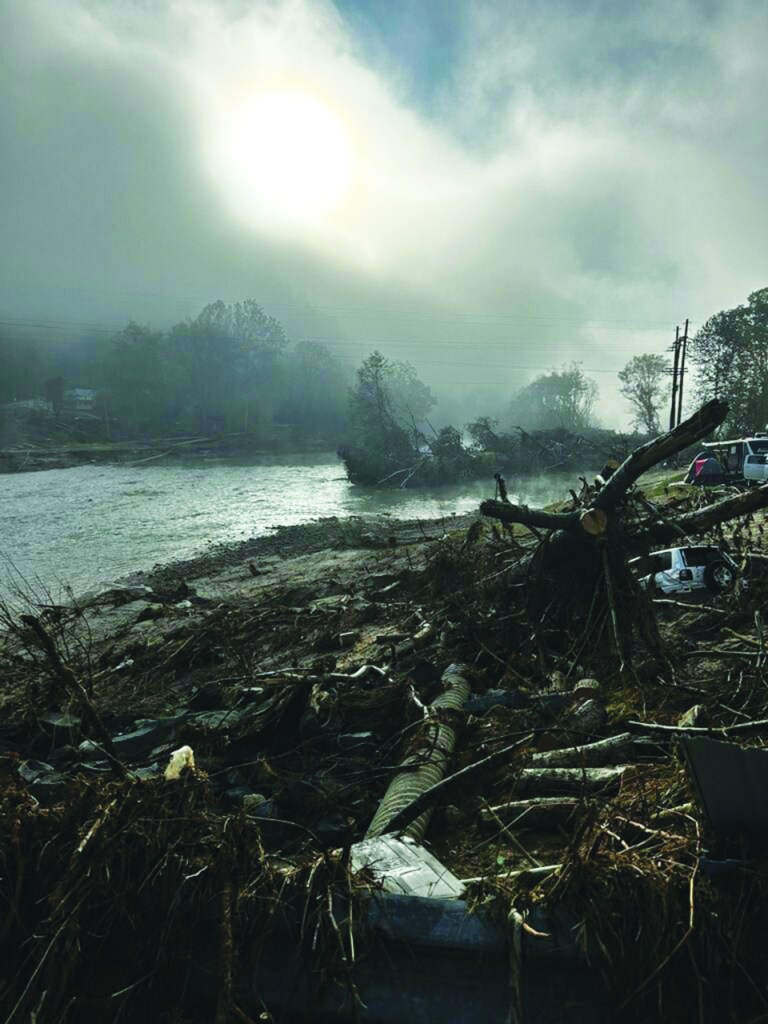Sheriff’s officers help mountain communities
Published 2:04 pm Tuesday, October 29, 2024
|
Getting your Trinity Audio player ready...
|
By Mike Barnhardt
Enterprise Record
When the call came for volunteers to assist with recovery from Hurricane Helene in the North Carolina mountains, Davie Sheriff J.D. Hartman had no problem finding willing law enforcement officers.
Two groups of Davie sheriff’s deputies – one in early October to Old Fort, and another about mid-month to Mitchell County – are back at home, thankful they were able to help and thoughts of how things would go in Davie County if it was struck by surprise natural disaster.
Lt. Mark Crater made both trips, and would head out again if called.
The creek that runs through Old Fort turned into a raging river, leaving mud and debris in buildings and on streets across town.
“A lot of people lost everything,” he said. “The roads were bad in both places. In Mitchell, you had flooding on the Toe River, the rest of the damage was tornadoes and mudslides.”
A lack of warning barricades made travel even more treacherous. The roads were marked with a big “X,” and one appeared to go over a hill, but once you got to the top, the road was no longer there. Just gone.
Crater had been on recovery efforts in eastern North Carolina after hurricanes, and said there is no comparison.
Not only do coastal communities plan for such disasters there, the water rises then recedes. In the mountains, it flows. And flows, taking down anything in its path.
Most of his time was spent on patrols, and the residents were glad to see those patrols.
“It shows how well people can come together and take care of themselves,” Crater said. “One person set up a grill, and fed everybody every day. No charge. They were very pleased to have us there, and would always thank us for coming.”
•
Deputy Nathan Whitley was among the younger Davie deputies to volunteer for the project, spending his time in Mitchell County.
“To me, it’s just helping out my fellow North Carolinians. The opportunity arose, and I had to jump at it.”
He spent his time on patrol, and helping to find people.
“We did a lot of welfare checks. Churches would have lists of people, and we would try to go track them down. There were volunteers from all over the United States. It was mind blowing.
“The way that community came together was amazing. Everybody was keeping their heads up. They’re tough people up there.”
While there, his mind began to think about Davie. “I took a lot of mental notes, things I would try to mention if we had something like that to happen here.”
For one, he learned that churches played an important role in helping people. With the abundance of churches in Davie, that would be a natural starting point, he said.
•
Sgt. Chris Gaddy spent his time in McDowell County. “It’s just part of the job. You have to have a servant’s heart.”
Old Fort, he said, looked like a war zone. Most of his work was law enforcement related, some of it just to let people know they were around. They also helped at supply distribution points.
“There was absolutely no communication system when we got there,” Gaddy said. “Nobody was prepared. The water had moved houses and caused a lot of damage and destruction.”
Even the bear he encountered, the first he had ever seen, had lost its home, Gaddy said. “A lot of wildlife was displaced. It’s heartbreaking. It’s going to take years for that area to recover.”
•
Sgt. Jason Robertson agreed.
“There’s a lot of mess and a lot of clean up to go up there. It was just awful.”
The group was housed at an unoccupied school building, which also had a site for National Guard and Samaritan’s Purse helicopters to land and take off.
“Most of the people we talked to were in pretty good spirits,” he said. “There are some really good people up there. Most would say they were blessed beyond measure.”
None of the residents said anything about moving. He was in Mitchell County, where generations of families still live. It’s a remote area with a lot of National Forest land, and few roads to get to anywhere. He remembers the third generation owner of Thomas Grocery, near the Tennessee state line, who vowed to open again some day.
There were places where every tree for 100 yards was laid down. If it was along the river, it was just gone. He remembers driving through one area with mud walls on both sides of the road, where it had been moved to allow for travel.
“The dump trucks were running non stop. The National Guard was working on the Toe River road to make it passable.
“It makes you think, what if something like this happened here (Davie)? Would we be prepared for it?”
•
Lt. Wes Martin said that even after mid-October, he talked to someone daily who had just gotten telephone service, or electricity. He saw one instance where it took three days to restore electricity to one customer. The homes are that far apart, and the number of roads to get around are limited.
The Mitchell Sheriff’s Office has only 24 employees, and they had been working almost non-stop before the help arrived. “We were there for law enforcement duties, sometimes just being visible at the distribution centers.” The Davie officers answered some calls, and made many welfare checks.
They couldn’t go 10 minutes without someone thanking them for being there.
“The amount of supplies coming in was amazing,” Martin said. “Everybody truly wanted to help each other.”
And if they need more help, Davie will be ready to respond.
“Sheriff Hartman said we’ll keep on going up there as long as we are needed,” Martin said.
Davie’s contingencies were a part of the N.C. Sheriff’s Association’s coordinated effort to provide supplemental law enforcement officers to those communities.
A total of 78 sheriff’s offices in the state sent deputies to the mountains, some with special equipment to help with recovery efforts. Davie took marked UTVs to help with patrols.




